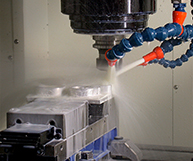7 Tips for Machining Aluminum Alloys
Posted by
Gosiger on Fri, Mar 28, 2014
 Machining aluminum alloys for aerospace, electronics, computers, and other applications presents a number of challenges for CNC machine shops. If you’re considering expanding your capabilities to include making aluminum alloy parts, there are a number of important factors to consider:
Machining aluminum alloys for aerospace, electronics, computers, and other applications presents a number of challenges for CNC machine shops. If you’re considering expanding your capabilities to include making aluminum alloy parts, there are a number of important factors to consider:
- VMC or HMC? If your shop relies heavily on Vertical Machining Centers, you may wish to consider adding a Horizontal Machining Center for aluminum alloy production. HMCs provide superior chip control, automatic pallet indexing and rotation (B axis) as part of their basic design.
- Thermal Stability. Aluminum alloys are more susceptible to temperature variations. Therefore a machine tool designed both structurally and through sophisticated compensation hardware and software for optimum thermal stability will enable you to hold tolerances more precisely.
- Spindle Horsepower. Although aluminum is more free cutting than harder materials, it still consumes a substantial amount of horsepower, especially with aggressive speeds and feed rates. The spindle should be capable of speeds in excess of 12,000 RPM with a sufficient horsepower rating for your applications.
- Through Spindle and Flood Coolant. For optimum efficiency machining aluminum alloys you should have the ability to apply high-pressure coolant at least 1000 psi during many machining operations, and be able to flush chips away from the cutting zone. A programmable, variable pressure system is the best choice for all applications.
- Chip Conveyor. Aluminum chips can create a bottleneck to your workflow and standard hinge belt conveyors may not be able to keep up with the demands of your machining operation. The best solution is a self-cleaning, filtering chip conveyor that can filter coolant to 250 or 500 microns.
- CNC Control. Machining complex shapes in aluminum alloys requires a sophisticated control system that enables you to program multiple axes, control contour, support NURBS programming, interface with multiple CAD/CAM software, and much more.
- Resources. There are a number of other factors to consider when machining aluminum alloys, including tooling, in-process or post-process inspection, and loading and unloading parts. The Gosiger team brings over 90 years of machine tool experience, wide-ranging applications experience, plus unmatched technical service and customer support to help customers – just like you – find the best solutions for any manufacturing challenge. Call Gosiger for more information.
 |